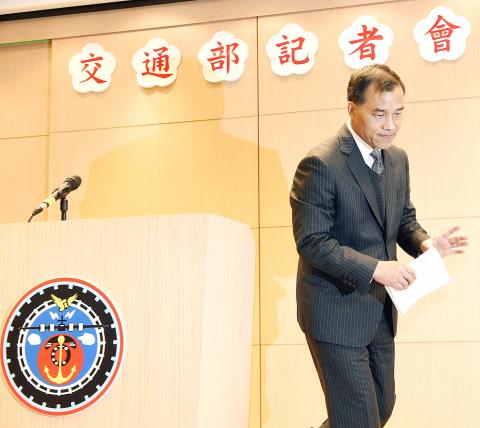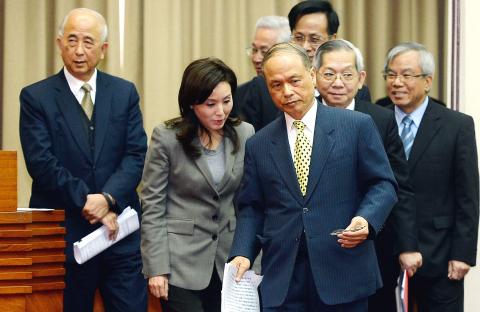Minister of Transportation and Communications Yeh Kuang-shih (葉匡時) resigned yesterday after Taiwan High Speed Rail Corp’s (THSRC, 台灣高鐵) financial restructuring plan failed to secure the bipartisan support it needed to be approved by the legislature’s Transportation Committee.
THSRC chairman Tony Fan (范志強) also tendered his resignation following the setback at the legislature.
In response to Yeh’s announcement, Presidential Office spokesperson Ma Wei-kuo (馬瑋國) said that President Ma Ying-jeou (馬英九) supports Premier Mao Chi-kuo’s (毛治國) bid to keep Yeh as transport minister.

Photo: Chen Chih-chu, Taipei Times
According to the ministry, if the plan wins legislative approval, THSRC will have 59 more years to continue operating the current build-operate-transfer model.
Under a ministry financial model, the rail operator during that time would register a total revenue of NT$3.1582 trillion (US$98.7 million), from which NT$196.4 billion could be paid to shareholders as dividends — after deducting NT$1.43 trillion in operating costs, NT$550.1 billion in facilities and equipment costs, NT$316.9 billion in bank loans and NT$485.4 billion in interest payments.
The Bureau of High Speed Rail said last week that yesterday was the government’s last chance to salvage the debt-ridden company from bankruptcy, which if not prevented, could take place in March or April.

Photo: Lin Cheng-kun, Taipei Times
However, Chinese Nationalist Party (KMT) and Democratic Progressive Party lawmakers on the committee unanimously elected to hold off on reviewing the plan, saying they are convinced that extending the high-speed rail operator’s concession period by 40 years would only benefit investors, not the public.
Shih Jun-ji (施俊吉), who served as chairman of Financial Supervisory Commission during the DPP’s eight years in power, argued that the ministry’s proposal was designed to benefit “certain individuals” and the rail company’s future stock holders would be able to reap an annual return on investment of 5.9 percent for 58 years.
Some lawmakers also said that the government should let the company go bankrupt and then take it over later, while others said that the ministry had grossly exaggerated the numbers and still others said that dealing with the plan is neither an urgent, nor a fair task.
Yeh said he has made addressing the high-speed rail’s financial predicament one of his top priorities since he took office in 2013, adding that he has been working closely with THSRC and the Bureau of High Speed Rail since then to avoid the operator’s imminent bankruptcy.
He also said that he had personally briefed the committee six times over the high-speed rail operator’s financial status, and that ministry officials and THSRC management had also privately explained the severity of the issue to lawmakers on many occasions.
“However, the committee still failed to approve the financial restructuring plan — this will lead to the bankruptcy of THSRC. Therefore, the Ministry of Transportation and Communications must prepare to take over and buy back the high-speed rail system. Under these circumstances, all parties involved would become losers,” Yeh said.
Yeh stressed that the plan was sought to dilute the THSRC shares held by five original investors by first reducing capital, before transforming the operator into a company dominated by state-run or state-invested institutions, as well as the public, by raising capital later.
He added that the plan was meant to allow everyone in the nation to oversee the company and benefit from its operations.
“Unfortunately, many people have misunderstood the plan. Some media outlets and even experts have deliberately obscured the spirit of this plan and said that it was designed to benefit certain private corporations. Personally, I find such accusations unacceptable. Yet based on my belief that government officials should be held responsible for the policies they promote, I thereby hand in my resignation,” he said, apologizing to the public and to coworkers who supported him for failing to meet their expectations.
Yeh left the news conference immediately after his announcement, without commenting on what the government would do to save the high-speed rail system.
At the Legislative Yuan, Yeh said that the ministry would not make any further efforts to push for the financial restructuring plan to pass at the legislature and will prepare to take over the operation of the high-speed rail system.
“Maybe I was incompetent in my handling of this matter,” Yeh said.
“We were hoping that the legislature would approve the financial restructuring plan, because I believe it is the better option for solving THSRC’s financial problems — the government takeover is a solution that produces no winner,” Yeh said.
“Since lawmakers failed to reach a consensus on this issue, we will just have to start preparing for that option [government takeover],” Yeh added.
Yeh said that the ministry will ensure that the high-speed rail system continues to operate.
Asked how he felt about the result being handed down on his birthday, he said that it just so happened that his birthday had coincided with the most important day in the history of Taiwanese transport.
“I believe I will include this process when I write my memoir,” he said.
The ministry also issued a statement urging the company’s main shareholders to take responsibility for solving the problem.
“The company’s main shareholders should make the interests of high-speed rail passengers their top priority and strive to keep the system running before the company and the government complete the remaining procedures based on the contract terms,” the ministry said.
The ministry also denied that the high-speed rail system would generate a profit of NT$800 billion (US$25 billion) if THSRC were given 40 years to operate, saying that the figure represents total revenue income prior to the deduction of costs and taxes.
“Based on our analysis, the company is only set to generate earnings per share of approximately NT$0.66 per year on average, which is a reasonable return on investment over a 59-year period,” the ministry added.
Additional reporting by CNA

CHAOS: Iranians took to the streets playing celebratory music after reports of Khamenei’s death on Saturday, while mourners also gathered in Tehran yesterday Iranian Supreme Leader Ayatollah Ali Khamenei was killed in a major attack on Iran launched by Israel and the US, throwing the future of the Islamic republic into doubt and raising the risk of regional instability. Iranian state television and the state-run IRNA news agency announced the 86-year-old’s death early yesterday. US President Donald Trump said it gave Iranians their “greatest chance” to “take back” their country. The announcements came after a joint US and Israeli aerial bombardment that targeted Iranian military and governmental sites. Trump said the “heavy and pinpoint bombing” would continue through the week or as long

TRUST: The KMT said it respected the US’ timing and considerations, and hoped it would continue to honor its commitments to helping Taiwan bolster its defenses and deterrence US President Donald Trump is delaying a multibillion-dollar arms sale to Taiwan to ensure his visit to Beijing is successful, a New York Times report said. The weapons sales package has stalled in the US Department of State, the report said, citing US officials it did not identify. The White House has told agencies not to push forward ahead of Trump’s meeting with Chinese President Xi Jinping (習近平), it said. The two last month held a phone call to discuss trade and geopolitical flashpoints ahead of the summit. Xi raised the Taiwan issue and urged the US to handle arms sales to

State-run CPC Corp, Taiwan (CPC, 台灣中油) yesterday said that it had confirmed on Saturday night with its liquefied natural gas (LNG) and crude oil suppliers that shipments are proceeding as scheduled and that domestic supplies remain unaffected. The CPC yesterday announced the gasoline and diesel prices will rise by NT$0.2 and NT$0.4 per liter, respectively, starting Monday, citing Middle East tensions and blizzards in the eastern United States. CPC also iterated it has been reducing the proportion of crude oil imports from the Middle East and diversifying its supply sources in the past few years in response to geopolitical risks, expanding

Pro-democracy media tycoon Jimmy Lai’s (黎智英) fraud conviction and prison sentence were yesterday overturned by a Hong Kong court, in a surprise legal decision that comes soon after Lai was jailed for 20 years on a separate national security charge. Judges Jeremy Poon (潘兆初), Anthea Pang (彭寶琴) and Derek Pang (彭偉昌) said in the judgement that they allowed the appeal from Lai, and another defendant in the case, to proceed, as a lower court judge had “erred.” “The Court of Appeal gave them leave to appeal against their conviction, allowed their appeals, quashed the convictions and set aside the sentences,” the judges